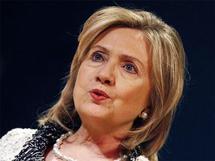
The chief US diplomat's talks are set for Friday and Saturday, just before she attends the second "Friends of Syria" meeting Sunday in Istanbul that will draw not just Arab delegates but also those from Turkey and Western powers.
The disparate Syrian opposition is expected to attend, just as they did when the first such conference was held in Tunis last month.
Saudi Arabia and its neighbor Qatar have called for arming the Syrian opposition, but the United States and Turkey now agree on the need to send "non-lethal" aid to Syrian rebels, including communications equipment.
In Riyadh, Clinton will attend the first ministerial meeting of the Gulf Cooperation Council-US strategic cooperation forum, which is likely to also raise the perceived threat from Iran across the Gulf.
The council known as the GCC is composed of heavyweight Saudi Arabia, Qatar, Kuwait, Bahrain, the United Arab Emirates and Oman.
"She will discuss the full range of bilateral and regional issues, including ongoing security cooperation in the region, as well as the international community's continuing efforts to stop the bloodshed in Syria," Nuland said.
Repeating an announcement she made last week, Nuland said Clinton will later Saturday travel to the Turkish city of Istanbul to attend the second meeting of the "Friends of the Syrian People."
The grouping is also known as the "Friends of Syria."
The meeting will build on efforts in Tunis last month to end the violence, enable the delivery of humanitarian aid and launch a democratic process aimed at replacing Syrian President Bashar al-Assad, according to Nuland.
Clinton will also meet one-on-one with Turkish Foreign Minister Ahmet Davutoglu and other foreign leaders, the statement said.
During talks in Seoul on Sunday, US President Barack Obama and Turkish Prime Minister Recep Tayyip Erdogan agreed the Istanbul talks should work on furnishing communications equipment and medical supplies to the rebels, a US official said.
The rebels are badly outgunned by Syria's armed forces but the White House has said that it does not favor arming them, arguing that further "militarizing" the conflict would worsen civilian bloodshed.
The Obama administration appears to fear that any weapons sent to Syria would be at risk of falling into the wrong hands, and does not appear to have full confidence in rebel groups or a clear picture of their makeup.
Meanwhile, Kofi Annan, the UN and Arab League envoy, is preparing to visit Beijing after talks in Moscow. China and Russia blocked past US-backed efforts in the UN Security Council to put the burden on Assad to end the bloodshed.
------------------------------------------------------------------------------------------------------
The disparate Syrian opposition is expected to attend, just as they did when the first such conference was held in Tunis last month.
Saudi Arabia and its neighbor Qatar have called for arming the Syrian opposition, but the United States and Turkey now agree on the need to send "non-lethal" aid to Syrian rebels, including communications equipment.
In Riyadh, Clinton will attend the first ministerial meeting of the Gulf Cooperation Council-US strategic cooperation forum, which is likely to also raise the perceived threat from Iran across the Gulf.
The council known as the GCC is composed of heavyweight Saudi Arabia, Qatar, Kuwait, Bahrain, the United Arab Emirates and Oman.
"She will discuss the full range of bilateral and regional issues, including ongoing security cooperation in the region, as well as the international community's continuing efforts to stop the bloodshed in Syria," Nuland said.
Repeating an announcement she made last week, Nuland said Clinton will later Saturday travel to the Turkish city of Istanbul to attend the second meeting of the "Friends of the Syrian People."
The grouping is also known as the "Friends of Syria."
The meeting will build on efforts in Tunis last month to end the violence, enable the delivery of humanitarian aid and launch a democratic process aimed at replacing Syrian President Bashar al-Assad, according to Nuland.
Clinton will also meet one-on-one with Turkish Foreign Minister Ahmet Davutoglu and other foreign leaders, the statement said.
During talks in Seoul on Sunday, US President Barack Obama and Turkish Prime Minister Recep Tayyip Erdogan agreed the Istanbul talks should work on furnishing communications equipment and medical supplies to the rebels, a US official said.
The rebels are badly outgunned by Syria's armed forces but the White House has said that it does not favor arming them, arguing that further "militarizing" the conflict would worsen civilian bloodshed.
The Obama administration appears to fear that any weapons sent to Syria would be at risk of falling into the wrong hands, and does not appear to have full confidence in rebel groups or a clear picture of their makeup.
Meanwhile, Kofi Annan, the UN and Arab League envoy, is preparing to visit Beijing after talks in Moscow. China and Russia blocked past US-backed efforts in the UN Security Council to put the burden on Assad to end the bloodshed.
------------------------------------------------------------------------------------------------------









 Home
Home Politics
Politics









